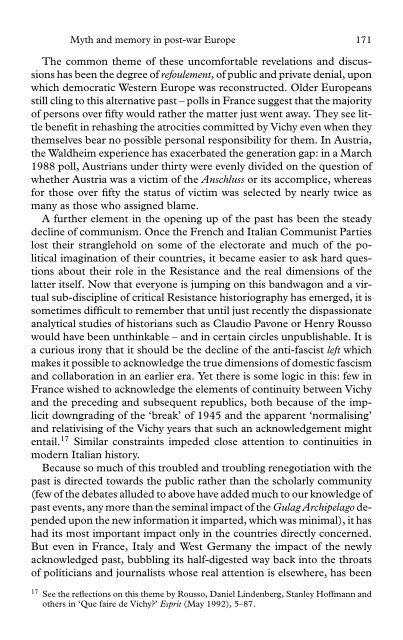Memory and Power in Post-War Europe: Studies in the Presence of ...
Memory and Power in Post-War Europe: Studies in the Presence of ...
Memory and Power in Post-War Europe: Studies in the Presence of ...
You also want an ePaper? Increase the reach of your titles
YUMPU automatically turns print PDFs into web optimized ePapers that Google loves.
Myth <strong>and</strong> memory <strong>in</strong> post-war <strong>Europe</strong> 171<br />
The common <strong>the</strong>me <strong>of</strong> <strong>the</strong>se uncomfortable revelations <strong>and</strong> discussions<br />
has been <strong>the</strong> degree <strong>of</strong> refoulement, <strong>of</strong> public <strong>and</strong> private denial, upon<br />
which democratic Western <strong>Europe</strong> was reconstructed. Older <strong>Europe</strong>ans<br />
still cl<strong>in</strong>g to this alternative past – polls <strong>in</strong> France suggest that <strong>the</strong> majority<br />
<strong>of</strong> persons over fifty would ra<strong>the</strong>r <strong>the</strong> matter just went away. They see little<br />
benefit <strong>in</strong> rehash<strong>in</strong>g <strong>the</strong> atrocities committed by Vichy even when <strong>the</strong>y<br />
<strong>the</strong>mselves bear no possible personal responsibility for <strong>the</strong>m. In Austria,<br />
<strong>the</strong> Waldheim experience has exacerbated <strong>the</strong> generation gap: <strong>in</strong> a March<br />
1988 poll, Austrians under thirty were evenly divided on <strong>the</strong> question <strong>of</strong><br />
whe<strong>the</strong>r Austria was a victim <strong>of</strong> <strong>the</strong> Anschluss or its accomplice, whereas<br />
for those over fifty <strong>the</strong> status <strong>of</strong> victim was selected by nearly twice as<br />
many as those who assigned blame.<br />
A fur<strong>the</strong>r element <strong>in</strong> <strong>the</strong> open<strong>in</strong>g up <strong>of</strong> <strong>the</strong> past has been <strong>the</strong> steady<br />
decl<strong>in</strong>e <strong>of</strong> communism. Once <strong>the</strong> French <strong>and</strong> Italian Communist Parties<br />
lost <strong>the</strong>ir stranglehold on some <strong>of</strong> <strong>the</strong> electorate <strong>and</strong> much <strong>of</strong> <strong>the</strong> political<br />
imag<strong>in</strong>ation <strong>of</strong> <strong>the</strong>ir countries, it became easier to ask hard questions<br />
about <strong>the</strong>ir role <strong>in</strong> <strong>the</strong> Resistance <strong>and</strong> <strong>the</strong> real dimensions <strong>of</strong> <strong>the</strong><br />
latter itself. Now that everyone is jump<strong>in</strong>g on this b<strong>and</strong>wagon <strong>and</strong> a virtual<br />
sub-discipl<strong>in</strong>e <strong>of</strong> critical Resistance historiography has emerged, it is<br />
sometimes difficult to remember that until just recently <strong>the</strong> dispassionate<br />
analytical studies <strong>of</strong> historians such as Claudio Pavone or Henry Rousso<br />
would have been unth<strong>in</strong>kable – <strong>and</strong> <strong>in</strong> certa<strong>in</strong> circles unpublishable. It is<br />
a curious irony that it should be <strong>the</strong> decl<strong>in</strong>e <strong>of</strong> <strong>the</strong> anti-fascist left which<br />
makes it possible to acknowledge <strong>the</strong> true dimensions <strong>of</strong> domestic fascism<br />
<strong>and</strong> collaboration <strong>in</strong> an earlier era. Yet <strong>the</strong>re is some logic <strong>in</strong> this: few <strong>in</strong><br />
France wished to acknowledge <strong>the</strong> elements <strong>of</strong> cont<strong>in</strong>uity between Vichy<br />
<strong>and</strong> <strong>the</strong> preced<strong>in</strong>g <strong>and</strong> subsequent republics, both because <strong>of</strong> <strong>the</strong> implicit<br />
downgrad<strong>in</strong>g <strong>of</strong> <strong>the</strong> ‘break’ <strong>of</strong> 1945 <strong>and</strong> <strong>the</strong> apparent ‘normalis<strong>in</strong>g’<br />
<strong>and</strong> relativis<strong>in</strong>g <strong>of</strong> <strong>the</strong> Vichy years that such an acknowledgement might<br />
entail. 17 Similar constra<strong>in</strong>ts impeded close attention to cont<strong>in</strong>uities <strong>in</strong><br />
modern Italian history.<br />
Because so much <strong>of</strong> this troubled <strong>and</strong> troubl<strong>in</strong>g renegotiation with <strong>the</strong><br />
past is directed towards <strong>the</strong> public ra<strong>the</strong>r than <strong>the</strong> scholarly community<br />
(few <strong>of</strong> <strong>the</strong> debates alluded to above have added much to our knowledge <strong>of</strong><br />
past events, any more than <strong>the</strong> sem<strong>in</strong>al impact <strong>of</strong> <strong>the</strong> Gulag Archipelago depended<br />
upon <strong>the</strong> new <strong>in</strong>formation it imparted, which was m<strong>in</strong>imal), it has<br />
had its most important impact only <strong>in</strong> <strong>the</strong> countries directly concerned.<br />
But even <strong>in</strong> France, Italy <strong>and</strong> West Germany <strong>the</strong> impact <strong>of</strong> <strong>the</strong> newly<br />
acknowledged past, bubbl<strong>in</strong>g its half-digested way back <strong>in</strong>to <strong>the</strong> throats<br />
<strong>of</strong> politicians <strong>and</strong> journalists whose real attention is elsewhere, has been<br />
17 See <strong>the</strong> reflections on this <strong>the</strong>me by Rousso, Daniel L<strong>in</strong>denberg, Stanley H<strong>of</strong>fmann <strong>and</strong><br />
o<strong>the</strong>rs <strong>in</strong> ‘Que faire de Vichy?’ Esprit (May 1992), 5–87.
















